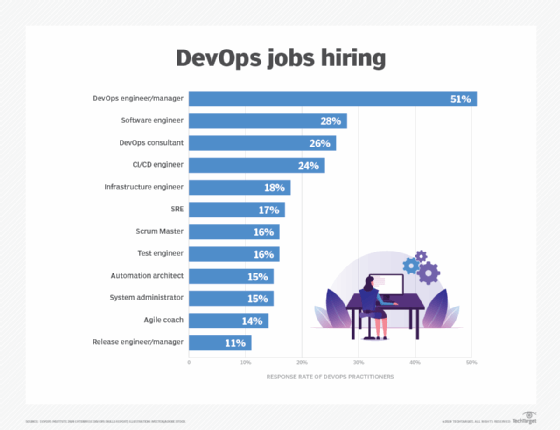
Tierney - stock.adobe.com
Prepare for the rise of the IT automation architect
As IT infrastructures become more complex, and development cycles more rapid, organizations increasingly lean on automation -- and those with the skills to oversee it.
IT automation began as simple scripts passed to a system's command-line interface, but became much more sophisticated -- and programmable -- with infrastructure virtualization. IT staff members have had to broaden their skills accordingly.
IT automation can now exploit powerful APIs and intent-based systems, which add another layer of abstraction, enhanced by machine learning models that adapt to changing conditions. The integration of highly automated IT and application development requires careful planning, design, product evaluation and testing. This has fostered a new IT role within many organizations, and particularly DevOps shops: the automation architect.
Define the role
The IT automation architect role is new enough that there isn't a widely accepted definition for the job. The role undoubtedly gained IT executives' attention amid the costly proliferation of often-redundant automation tools and processes -- a trend identified by analyst firm Gartner. The firm contends that this proliferation hinders infrastructure scalability, and that by 2025, the most sophisticated IT organizations will have a formal strategy to address ad hoc automation issues.
In general, an automation architect is one of the most senior positions in IT, overseeing all decisions related to IT and development automation strategy and policy. As such, architects must work with a variety of technical teams and business units to assess needs, define projects, win support for key initiatives and manage them to completion.
Specifically, IT automation architects have the following responsibilities:
- Set standards for automation processes, tools and their usage across IT operations, software development and testing.
- Define the technical and business requirements -- and their relative priority -- that automation policies and tools must meet.
- Enforce mechanisms to ensure compliance with automation policies.
- Document implementation and maintenance policies, along with personnel assignments, for automation tool administration and management.
- Exercise final authority over move-to-production decisions -- such as whether to automatically push new or updated software through a CI/CD pipeline onto production infrastructure.
- Manage and resolve personnel and other non-technical issues related to automation standards, policies and processes.
Required skills and experience
IT automation architects are typically found in DevOps organizations. It's fruitless to focus on a comprehensive automation strategy without a cooperative, integrated DevOps structure already in place. Because of the specialized nature of the job, architects are typically found in larger enterprises or those, like many cloud-native startups, that have mature DevOps practices.
There's a wide variety of job titles and associated skills found under the DevOps umbrella. For example, a recent DevOps skills report from the DevOps Institute, a learning association for DevOps professionals, identified more than a dozen DevOps job titles for which organizations are hiring. "DevOps engineer/manager" was the most common title, cited by 51% of survey respondents -- who were comprised of IT professionals, DevOps practitioners, HR managers and consultants. "Automation architect" was the 9th most cited job title at 15%. The following chart summarizes other notable job titles and their response rates.

When the same group of survey respondents was asked to rate the importance of various skills to DevOps work, proficiency at automation ranked at the top, with 66% citing it as very important and only 1% listing it as optional or unimportant. Of equal importance were process skills and knowledge, with only 3% listing these as unimportant. It's not surprising that these are ranked as the most essential DevOps skills; you can't automate a process you don't understand and haven't fully defined.
Aside from a thorough understanding of DevOps processes, other valuable skills for the automation architect and engineering role include:
- Proficiency in one or more computing languages -- especially scripting languages, such as Python, Ruby, PHP and Go -- as well as experience using external APIs in automation code;
- Knowledge of source code and revision control systems, along with CI/CD tools like Git and Jenkins;
- Basic understanding of statistics, data science and machine learning, with bonus points for experience with the R and SQL languages and related tools, such as Jupyter, Spark, Tableau and PowerBI;
- Project management skills;
- Experience with business requirements, financial or budget reports and KPIs, and the ability to create ROI models;
- Soft or human skills, such as effective negotiation, collaboration and conflict resolution; and
- Proficient oral and written communication skills, including the ability to tailor presentations to both executive and technical audiences.
The automation architect role is an excellent career path to upper management, as it exposes practitioners to a variety of technical problems, business requirements and management situations.
Looking ahead
Automation architects are still a rare breed in enterprise IT organizations. Nevertheless, with the rising complexity of cloud infrastructure, a desire to deliver new products and services more quickly, and current financial requirements to do more work with fewer resources, holistic process automation will become a critical component of top IT organizations.
As the leader of automation strategies and projects, architects will emerge as some of the most valued members of IT leadership teams. Indeed, Gartner predicts that more than 90% of enterprise infrastructure and operations organizations will have an automation architect by 2025 -- up from less than 20% in 2020.
The benefits of automation to IT are many, including higher efficiency and process repeatability. However, the benefits to individuals pursuing the architectural role are equally great. For example, recent data from job site Glassdoor suggests the average salary of automation architects is about $80,000, with many listings in six-figures. As more IT and development tools add AI automation features, it will only increase the value for highly trained and experienced automation architects.








